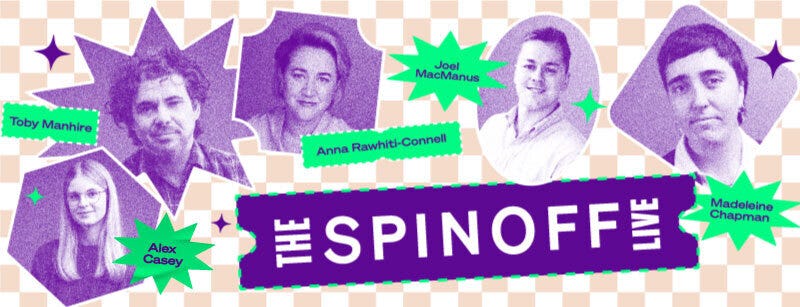Kids become myrtle rust busters with new game
A pair of apps aims to create a new crop of kaitiaki with the help of augmented reality.
Kia ora! Welcome to Future Proof. Thanks for joining me. This week: fintastic news for Tīkapa Moana, and a climate tech future for Wellington. But first: a new app gamifies the hunt for myrtle rust.
A new augmented reality app aims to empower rangatahi with knowledge about myrtle rust. Image credit: Scion.
Viewed through the iPad screen, a pōhutukawa tree branch is growing up through the carpet of the meeting room floor. I walk around the tree, aiming the screen to peek at all angles of the leaves, searching for telltale yellow splotches. The iPad dings: infection located!
I’m testing a new augmented reality app called Mātaihia te heka, that turns learning about myrtle rust into a game for rangatahi (young people).
Myrtle rust is a nasty fungal pathogen that arrived on New Zealand’s shores in 2017, blown across the Tasman from Australia. It infects plants in the myrtle family, like our iconic pōhutukawa, killing new shoots and leaves.
I’ve spent the last few months thinking a lot about myrtle rust for an upcoming story. I expected to spend lots of time inspecting trees – just not virtual ones! But New Zealand’s myrtle rust response is typified by creative problem-solving, I learnt, and is brimming with positive examples of partnership between te ao Māori and science – like a pair of new apps.
Spearheaded by Scion’s te ao Māori team, the twin apps aim to reach rangatahi by delivering information in “an inviting, engaging, fun way that’s relevant to them,” says Taiāwhio Waipoua-Bryers, research assistant.
‘E heke e Heka!’, available in both English and Te Reo Māori, takes the user on an interactive hīkoi (walk) through the ngahere (forest) with Tiki the native stick insect as a guide.
Crafted as a story, and with games embedded along the way, the app “bridges the gap between science and communities,” says Katerina Pihera-Ridge, an Indigenous environmental researcher who led the project.
Pihera-Ridge also envisioned a second gaming component that brings the ngahere to life with augmented reality – and that’s where the second app, Mātaihia te heka, comes in.
Left: the ‘E heke e Heka!’ app; right: a screengrab from the augmented reality game. Image credits: Scion / Kiwa Digital.
The apps offer “a gateway into the world of science, making future scientists,” says Waipoua-Bryers. Pihera-Ridge sees it as a way to “empower our rangatahi, Māori and community to be aware and informed as active explorers and kaitiaki.” Te Piataaio Raroa, another research assistant, notes the approach encourages users to apply their own observation methods, including maramataka (Māori lunar calendar).
An earlier testing session proved successful: “The rangatahi came to the session not knowing anything about myrtle rust, then they left teaching us about myrtle rust!” says Raroa. One nine-year-old tester even reported back about finding myrtle rust in real life, on a pōhutukawa tree.
At a launch yesterday, students from three kura were the first to play the final product. “We hope that this app sparks curiosity and inspires the next generation of scientists and kaitiaki (guardians) who already have a connection with te taiao environment,” says Pihera-Ridge.
E heke e Heka! is available for free on both Android and iOS. Mātaihia te heka is also free and is available on iOS.
Huge news: The Spinoff is doing live events and you’re invited
Our popular columns, podcasts, pop culture takes and politics are hitting the road. The Spinoff Live is a 10-event series across Auckland and Wellington, featuring live chats between our writers and special guests. Tickets are on sale now and going fast. Get yours today.
Wellington wants to become a hub for climate tech
In his latest Windbag column, Joel MacManus reports from a flashy summit, where the tech lead for economic development organisation WellingtonNZ said that climate tech was the city’s “most promising growth industry”. MacManus notes that “it’s not hard to see the enormous commercial opportunities”. Plus, the industry would be a good fit for the capital: “Wellington’s general vibe seems to suit climate tech people – ambitious in a nerdy way, principled and environmentalist.”
AI’s power grab
An AI query uses 10 times more energy than a simple Google search. To power up AI and a data-heavy future, big tech companies are building data centres in New Zealand with power needs estimated up to 600 megawatts – enough to power more than 600,000 homes. Nikki Macdonald reports for the Sunday Star Times (paywall) on what’s in the data centre pipeline, what the benefits could be, and whether our grid can handle enough power to feed the data beasts. Around the world, data centres are already straining power grids, according to Bloomberg, while the Washington Post reports that some tech companies are investigating highly experimental clean energy tech – like atomic fusion – to power the growing AI demand.
Give the people what they want: Climate action
Eighty percent of people globally want their government to take stronger climate action, according to a UN poll dubbed the People’s Climate Vote. Even more, 86%, want to see countries set aside geopolitical differences to work together on climate change. More than 75,000 people from 77 different countries (but not New Zealand) were asked 15 climate questions, revealing an “astonishing” consensus. Even in many of the world’s biggest oil, coal and gas producing states, a majority want to transition quickly to clean energy – for example 54% in the US, 75% in Saudi Arabia, and 69% in Australia. Overall, a global majority of 72% supports a quick transition away from fossil fuels. “The Peoples’ Climate Vote is loud and clear,” said UN Development Programme administrator Achim Steiner. “Global citizens want their leaders to transcend their differences, to act now and to act boldly to fight the climate crisis.”
Join The Spinoff Members
“The Spinoff is one of the great pleasures of my reading life, the repository of timely and quality journalism that continues to surprise, delight and inform.” – Denise, Spinoff Member since 2020.
If, like Denise, you enjoy our work and want to support us, please consider becoming a member today. Already a member? Ka nui te mihi, your support means the world to us.
More stories
Here are the native species the coalition government does want to save, outlined on The Post (paywall) in a list “leaked” to satirist Dave Armstrong.
Whenua Hou Codfish Island, instrumental in kākāpō recovery, celebrates 25 years of being predator free this week.
An estimated 60,000 people joined the “Restore Nature Now” peaceful protest in London, including Dames Emma Thompson and Judi Dench.
Byron Bay has banned balloons from all council buildings and outdoor areas to protect wildlife and waterways.
Extinction has always been New Zealand’s policy, writes Charlie Mitchell in The Press.
Six years on from a pioneering plastic ban, here’s how Vanuatu’s efforts to drastically reduce plastic are going.
Formula One is shifting to hybrid engines and renewable fuels – but is it just greenwashing?
A youth-led climate lawsuit in Hawaii has reached an “historic” settlement, requiring the state to decarbonise its transport system.
To finish this edition, a beautiful short video about the “snapperazzi” in Te Hāwere-a-Maki / Goat Island Marine Reserve by Frances Dickinson, aka Benthics. I’ve spent many summer days with the snapper and other creatures at Goat Island, so I was relieved to hear that a patch of the highly invasive seaweed Caulerpa was successfully removed from nearby Leigh Harbour last week. Plus, Tīkapa Moana may soon have more potential homes for the snapperazzi, as the environment select committee has endorsed the Hauraki Gulf / Tīkapa Moana Marine Protection Bill, which would create 19 more protection areas.
Fin-ishing on a high note,
Ellen
Future Proof is looking for a sponsor!
Connect your brand with an insightful exploration of environmental news, reaching influential readers committed to sustainability and staying informed about the state of our natural world. Contact commercial@thespinoff.co.nz to learn more.
Got some feedback about Future Proof or topics you’d like covered? Get in touch with me at futureproof@thespinoff.co.nz














We need to talk about the power use of data centres for energy hungry AI which could delay the decoupling of New Zealand’s grid from fossil fuelled energy. They will also need a lot of water to cool them.